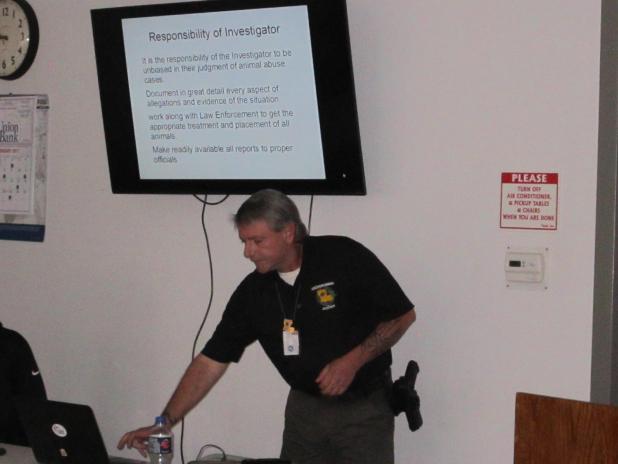
Toney Wade, of the Louisiana Animal Cruelty Task Force, instructs Marksville police officers on the procedure for investigating suspected cases of animal abuse. The four-hour class on Feb. 14 included a review of the various state laws and a “rating” system officers are to use to determine the level of abuse an animal has endured. {Photo by Raymond L. Daye}
Marksville P.D. trains to fight animal abuse
Cruelty to animals is a serious problem, and the Marksville Police Department is taking it seriously.
Several city police officers attended a four-hour training class on Feb. 14, learning the laws and investigative procedures to successfully bring to justice those who abuse animals. Toney Wade, of the Louisiana Animal Cruelty Task Force, conducted the class.
Police Chief Elster Smith said the police department gets calls about suspected animal abuse. An officer always responds to those complaints to ensure the animal in question has proper shelter, food and water.
The city’s most recent animal abuse case involved three horses that were roaming at large. All three were malnourished, but further investigation found that only one could be conclusively determined to constitute animal abuse/neglect. Smith said officers needed the class “to learn what to look for in an animal abuse case, know what paperwork is needed and the proper way to proceed in that kind of case.
“They don’t get this kind of training in the police academy,” Smith added.
Wade agreed, noting that there is not a minute dedicated to the subject of cruelty to animals in a police training academy. Yet, Louisiana ranked No. 3 in the nation in incidents of animal abuse/neglect.
“Animal cruelty in Louisiana is horrible,” Wade said. “I deal with a lot of horses statewide. Last year we took about 200 horses that were abused. About 30 percent of them didn’t make it. We got there too late.”
Wade told officers that a horse is a domestic animal, subject to the state laws, once the person puts it in a fenced area, rides and feeds it.
‘NOT MY ANIMAL’
Also, officers are not to end the investigation if the person says “that’s not my animal. “
Most people with abused or neglected animals on property will deny ownership, thinking that will avoid prosecution. Wade said the law makes the property owner responsible for any abused animals on his property.
Animals, even a horse, must have shelter from the weather. A horse without a roofed shelter would be considered abused.
Unsafe transporting of animals is also considered abuse.
“In St. Mary Parish, if your dog falls out the bed of your pickup truck, you are arrested,” Wade said. “They are good about enforcing that law.”
Wade said there are numerous incidents of hunting dogs being injured or killed because they were unsecured in the back of a pickup. Many people may not be aware that it is considered to be animal abuse.
Wade said there are two categories of animal cruelty -- simple and aggravated.
Simple cruelty can be charged on a first offense if the animal is neglected, malnourished, not provided medical care, etc., but not to the point of death or grave physical harm.
“Some cases can meet the criteria for simple or aggravated,” Wade said. “You have to use your judgment on whether to charge them with aggravated cruelty.”
He said an arrest for simple cruelty to animals carries a mandatory 40 hours of community service. Police departments cannot “make a deal” and waive that part of the penalty. The $1,000 fine and/or 6-month jail term may be suspended or adjusted.
State law makes the second arrest for animal abuse automatically aggravated cruelty -- even if both cases were “simple abuse” infractions.
PATTERN OF ABUSE
The reason is to try to break the individual’s pattern of abuse.
“In many cases, if they abuse an animal once, they will keep abusing animals,” Wade said. “The FBI has proven a correlation between animal cruelty and serial killing. The FBI monitors animal cruelty arrests for that reason.
“There is also a link between domestic abuse and animal cruelty,” Wade continued. “When you respond to a domestic abuse case, ask the woman if they have any animals. If they do, in about 90 percent of the cases the man will hurt the animal as another way to hurt the woman.”
In many cases, the officer will be making an arrest for domestic abuse and animal cruelty.
